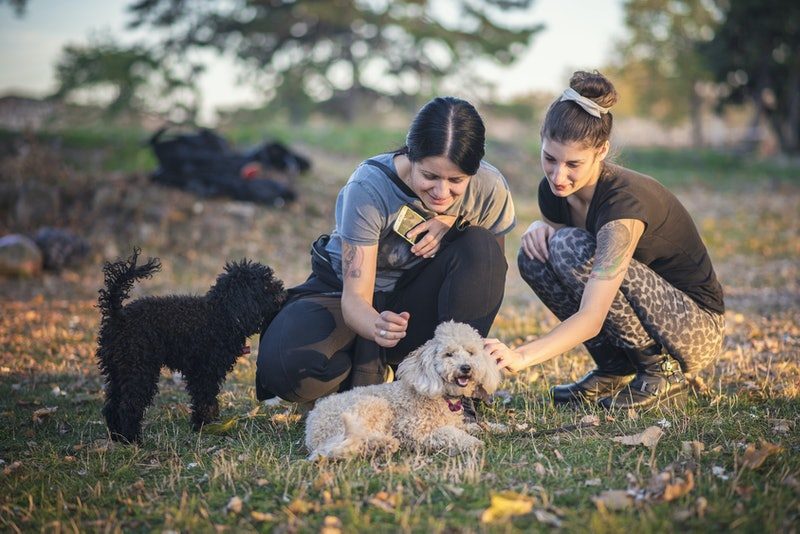Why pup-nuptials are a thing.
One of my favourite parts of writing this column is responding to the questions posed by my pet loving lesbian readers! This month I’ll tackle a question that I was sent on a very tough subject: How should lesbians going through a divorce decide who gets the fur kids?
First and foremost I have immense sympathy for anyone going through a divorce legally (thank you marriage equality!) or not. My best advice is that as much as the humans are hurting, the best thing is for them to think honestly about the feelings and needs of the pets. Don’t use the fur-kids as weapons to emotionally get back at your ex, or emotionally try to hurt them. Unfortunately over the years I have witnessed many friends go through divorces, and struggle through doing so ethically, especially where pets are concerned. I have seen everything from expensive and lengthy court battles over dog custody, to other divorcing couples who were able to draft and agree to detailed joint custody agreements of their dogs.
My partner and I have happily been together for over 13 years and so my only personal experience with pet custody came when I was nineteen and my live-in partner at the time and I were breaking up. We didn’t really have anything of value except for a CD collection, cats and dogs. Thankfully while that breakup was dramatic custody of our pets wasn’t up for debate. I got the dogs one of whom I brought into the relationship, my ex got custody of the cats who they brought in.
While it resolved easily, I remember the panic that we would have a disagreement. The first night we broke up I went to visit my chosen dyke moms for support, and my ex—who was supposed to be watching my dogs in our apartment—took them. when I got home in the morning the dogs were gone and I was panicked I would never see them again. This was pre-cell phones, so I had to call around to all of our friends where I thought the dogs might be.
Eventually the following night the dogs were brought home to me—I think a sign of how much work they were as opposed to it being based on ethics. Divorce and pet custody decisions are hard for everyone, but I suspect they are especially hard for LGBTQ couples because of the ways in which for many LGBTQ people who may be estranged from biological families animals play key roles in our chosen/built families.
Just like LGBTQ people, pets don’t always get their fair day in court when a divorce is happening.
While we consider our pets to be our children, overwhelmingly (this is starting to change in some areas) courts see them as personal property. This year, Alaska made legal first where divorce courts will now treat pets of the family more like they would human children than a piece of furniture. Alaska is the first state in the country where the courts must now take “into consideration the well-being of the animal” which enables judges to make decisions based on what is best for the pet’s welfare, including joint custody judgements and inclusion of pets in protective orders if there was domestic violence in the home.
Unfortunately even if you are in a jurisdiction that recognises deciding the custody furry kids should be handled more sensitively than who gets to keep the big screen TV. While our cats have lots of opinions about every aspect of their lives, cats aren’t able to tell a judge who they want to live with. General rule of ethically ending queer relationships seems to be the person who brings a pet into the relationship leaves with that pet, but what about animals adopted while the couple is together?
One option is to create an informal (or formal!) custody agreement while the relationship is good — a pup-nuptial/cat-nuptial agreement (if you will) for how you would handle custody in the unfortunate circumstance that the relationship ends.
For those who find that preemptive planning too fatalistic about the state of the relationship (myself very much included), and/or those who find themselves currently in the midst of divorce my best advice is to sit down with your ex either alone, or with the help of a mediator to create a custody plan or agreement that is based on the best needs of the pet(s) not your own emotions, or any desire to get back at an ex. Questions I would suggest asking yourself before beginning the negotiation include: who is the fur-kid most bonded to?
Who is responsible for most of their care? Is visitation an option? If you are considering a joint custody agreement what are the parameters for handoffs? Is moving back and forth something that would stress out your pet(s)?
Will you, and if so how will you communicate about a shared pet moving forward in the event of health changes etc.
